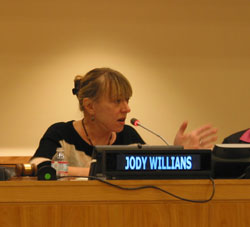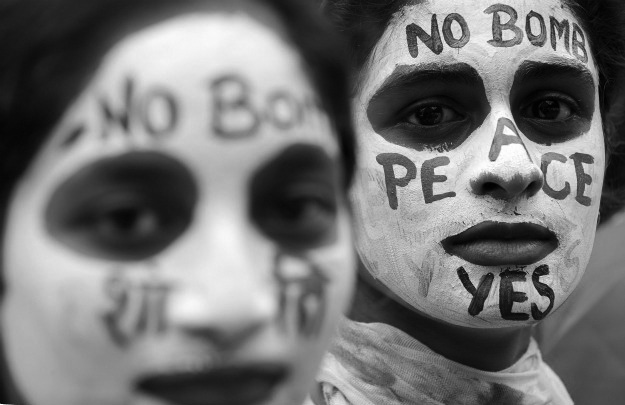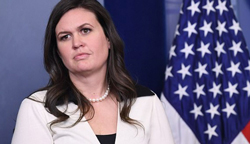Participation Through E-mails and Tweets Allowed Involvement During Internet Broadcast
 Nobel Prize winner Jody Williams gave a speech at the United Nations that was broadcasted over the internet where students could engage with her during an informal briefing.
Nobel Prize winner Jody Williams gave a speech at the United Nations that was broadcasted over the internet where students could engage with her during an informal briefing.
Jody Williams is a Nobel Peace Prize winner, grass roots activist, and has fought to ban landmines, for human rights, and against militarism. Williams said during the briefing, “I don’t care what anyone thinks about me. I don’t care if they agree with me or not. I believe what I believe for good reasons. I believe in sustainable peace, I believe in equality, I believe in justice, and if I make you uncomfortable that is your problem not mine.”
University students were able to watch the live briefing that was happening in the United Nations. The briefing began by the moderator, Ramu Damodaran declaring, “At one time the stage of history was always filled with kings and princes. And now one woman has come to change that, and her name is Jody Williams.” He continued by stating, “She has brought to the platform an individual without a platform.”
Williams explained that her advocacy began while attending the University of Vermont in the 1970s. While she was a university student, Vietnam War was taking place. She stated, “The war in Vietnam shattered the belief of the beautiful mythology of the US.”
She continued, “Every country creates a mythology and only talks about the good parts not the unpleasant parts. Vietnam wasn’t pleasant.” That was the first time she noticed the strong military presence the United States positioned around the world. For the past 30 years she has worked to stop U.S. militarism in Central America.
Her efforts to ban landmines received Williams’s global recognition. Landmines are explosive devices that are positioned in the ground and are triggered when the device senses a human presence. According to the United States Campaign to Ban Landmines, “There are between 70 and 80 million landmines in the ground in one-third of the world’s nations.”
When these landmines explode, there are many casualties that are not always the enemy. Williams saw the landmines as a threat to humanity, mobilized civil society, and was able to achieve an international treaty.
William was awarded a Nobel Peace Prize in 1997 for her work on the International Campaign to Ban Landmines. Williams explained the problematic nature of landmines by stating in her Nobel Peace Prize acceptance speech “when landmines are triggered, they can not distinguish between peace and war, soldier or civilian.”
According to NobelPrize.org, “Forty-four women in total have been awarded the Nobel Prize between 1901 and 2013.” After joining this selective group of women, Williams worked with other women Nobel Prize recipients to create The Nobel Women’s Initiative. NobelWomensInitiative.org described the Initiative by stating, “[it] uses the prestige of the Nobel Peace Prize and courageous women Peace Laureates to increase the power and visibility of women’s groups working globally for peace, justice and equality.”
Williams is an advocate of many causes including stopping gender violence in conflicted areas. One specific advocacy is ending rape as a war crime. Williams said, “Rape happens as a tactic of war because violence against women is accepted.”
Dr. Rekha Datta, assistant professor of political science, interactively communicated with Williams by stating “Thank you Jody for your passion, activism, and courage. And for being a role model for the youth and women around the world.”
Throughout the briefing, Williams continually declared “the glorification of war.” Williams cannot understand how the videogames, movies, and the news glorify war on a daily basis. She claims that if people were truly aware of how ugly war really is, they would stand up and protest the warsm Williams states.
“People want to believe in the benevolence of the United States.” She explained that the United States hids behind “benevolence” to invade countries and maintain the United State’s militant strength. Then, she declared that, “Since the beginning of the US, there has only been 24 years, scattered, that we have not been at war.”
Then Datta asked if militarism would be reduced if more world leaders were women. Williams responded, “ I think that whenever you diversify a group in power, where everyone feels like they are in power, the dialogue changes.”
Williams explained that the only way for countries to stop glorifying war is if they work to achieve sustainable peace. Sustainable peace is not just removing war from existence, but learning to co-exist in harmony with other cultures and countries. Without peace education and efforts to achieve sustainable peace in the near future militarism will continue to dominate the globe.
Dr. George Gonzalez, assistant professor philosophy, peligion and interdisciplinary studies, stated “I do not think that peace can ever be built on a foundation of militarism and the fear and devastation it breeds. In my view, we would be wise to look for alternative means of ensuring security, namely making sure that peoples across the globe have access to the resources (material and non-material) they need to flourish and live with dignity.”
Gonzalez continued, “This is what I take our own Professor Datta’s view to be and it is a view I share. Institutions will never solve all the problems life presents since life is never an idealization.”
Gonzalez continued, “The philosopher and anthropologist in me believes that. But it is also morally irresponsible to fail to engage and work to change and compel institutions that have the ability to make life more livable for others and ourselves. I was struck, as I have been by my colleague, Professor Datta, by the intellectual humility that underlies Professor Williams’ commitment to social justice.”
Then, William’s described The Campaign to Stop Killer Robots. This is another passion of William’s that has hastily produced a movement. This campaign focuses on the rapidly advancing technology that has transformed human warfare into creating fully autonomous weapons. StopKillerRobots.org states, “These robotic weapons would be able to choose and fire on targets on their own, without any human intervention.”
Williams clarified that Drones are not “Killer Robots” because a person is ultimately the one who decides to inflict havoc, not a machine. But, she holds a genuine distaste for drones because they fall within the gray area of technology advancements.
Gonzalez declared, “Today, [Williams’s] like Cassandra, demanding that we turn our attention to the future dangers presented by killer robots. We should be listening to her! But sometimes lessons have to be learned time and again, unfortunately.”
Daniel Roman, a junior political science major, stated, “I think the Jody Williams presentation was very educational. She was very passionate about human rights abuses that are occurring. And it was interesting to see how the US plays a militant role around the world.”
Williams strived to promote the importance of advocating for a cause by describing it as a privilege to watch minds open and see the world change.
She stated, “The root of the word activism is act.” Williams advised the students that anyone could become an activist. She told students to find one cause they were passionate about and dedicate time their efforts for that cause. She described that anyone could become an activist, “it’s not magic.”
Michael Hamilton, a senior political science student said, “I think the thing I found most interesting about Jodi Williams was her existential qualities she expressed. She is a woman of action instead as shown when she was comparing how the Buddhist meditation was good, but lacking in that it does not provide a means of actually getting things done.”
Williams tried to instill that changing the world is a huge process, and everyone’s actions make a difference even if we never know it. She declared, “There are a lot of people I don’t like, I am not a saint, but I want to make the world a better place for everyone.”
Ryan Kelly, a junior political science major, stated, “You have to admire Jody Williams and the courage she carries with her. Yes, everyone is aware of human rights, but not all are aware of the importance of human rights. This has been her job for quite some time, and based on what I saw, she is completing her job with flying colors.”
Gonzalez stated, “I believe that none of us are simply representatives of our roles in society. Yes, one may be a student or one may be a professor or a lifelong activist but all of us are in this life together. But we also live in a world of want, need and inequality.
Gonzalez continued, “The great education Monmouth students receive is a privilege and privileges come with responsibilities. A concern for social problems is part and parcel of the enterprise of critical thinking and well-rounded education. It’s not a view everyone shares but I do believe that commitment and engagement are the ways in which education is given life in our day-to-day lives.”
PHOTO TAKEN from un.org



